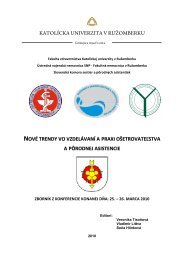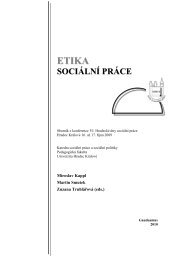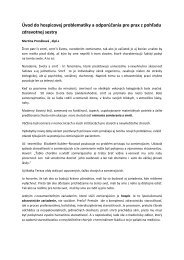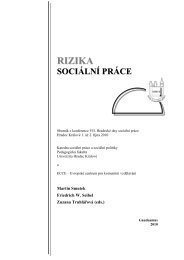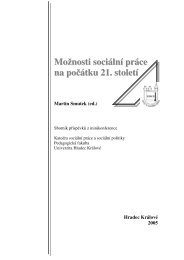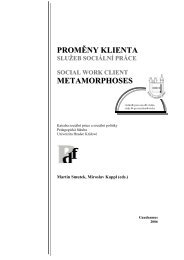Zmena klÃmy â možný dopad (nielen) na obyvateľstvo - Prohuman
Zmena klÃmy â možný dopad (nielen) na obyvateľstvo - Prohuman
Zmena klÃmy â možný dopad (nielen) na obyvateľstvo - Prohuman
Create successful ePaper yourself
Turn your PDF publications into a flip-book with our unique Google optimized e-Paper software.
Climate Change is a Human Security Problem<br />
Slovenia, although a young donor, is well aware of its own responsibility within<br />
the scope of joint efforts by the inter<strong>na</strong>tio<strong>na</strong>l community to guarantee world stability,<br />
security and all-round progress.<br />
The Resolution on Inter<strong>na</strong>tio<strong>na</strong>l Development Cooperation of the Republic of<br />
Slovenia until 2015, which is the key strategic document of Slovenia on inter<strong>na</strong>tio<strong>na</strong>l<br />
development cooperation, defines key geographical priorities (the Western<br />
Balkans Asia as the first geographical priority, Eastern Europe, the Caucasus and<br />
Central Asia as the second geographic priority, and Africa as the third) and thematic<br />
priorities, whereby environment-protection deserves our utmost attention.<br />
Climate change is a common concern for all humanity. Addressing climate<br />
change requires coordi<strong>na</strong>ted global action, based on the principle of common,<br />
but differentiated responsibility.<br />
Within the context of a more general environmental aspect, coping with climate<br />
change and its effects is becoming an integral part of global development efforts.<br />
With the Sustai<strong>na</strong>ble Development Goals being taken into consideration in<br />
a general deliberations on the post 2015 development agenda, climate change and<br />
disaster-risk reduction are becoming indispensable elements of or future work.<br />
On political level, main focus of our work under the UNFCCC by COP18/CMP8<br />
in Doha is to ensure a proper legal continuation under the second commitment<br />
period of the Kyoto protocol with its mechanisms and feasible mobilization of<br />
innovative and other long term sources of fi<strong>na</strong>ncing climate change.<br />
We must now ensure that the momentum of efficiently building the global<br />
agreement is kept during the negotiations in Doha. We all share responsibilities<br />
to ensure sustai<strong>na</strong>ble climate for the future (limiting global warming to below<br />
2° C both developed and developing countries need to step up their commitments<br />
to reduce emissions.)<br />
Climate change and climate variability are becoming greater and more worrying<br />
with each passing year. Impacts of pollution, urbanization, land use, land degradation<br />
interact with changing climate. All the existing environmental problems<br />
will be set into a different context and could aggravate due to climate change. Climate<br />
change is not merely an environmental issue. It has implications on human<br />
security (human health, food security, access to drinking water), economic and<br />
social development as well as inter<strong>na</strong>tio<strong>na</strong>l security (conflict over scarce resources,<br />
loss of territory and border conflicts, climate induced-migration).<br />
Climate threats are invariably water-related. Rising sea level, increasing water<br />
scarcity as well as more frequent floods and hurricanes are all attributable<br />
16





